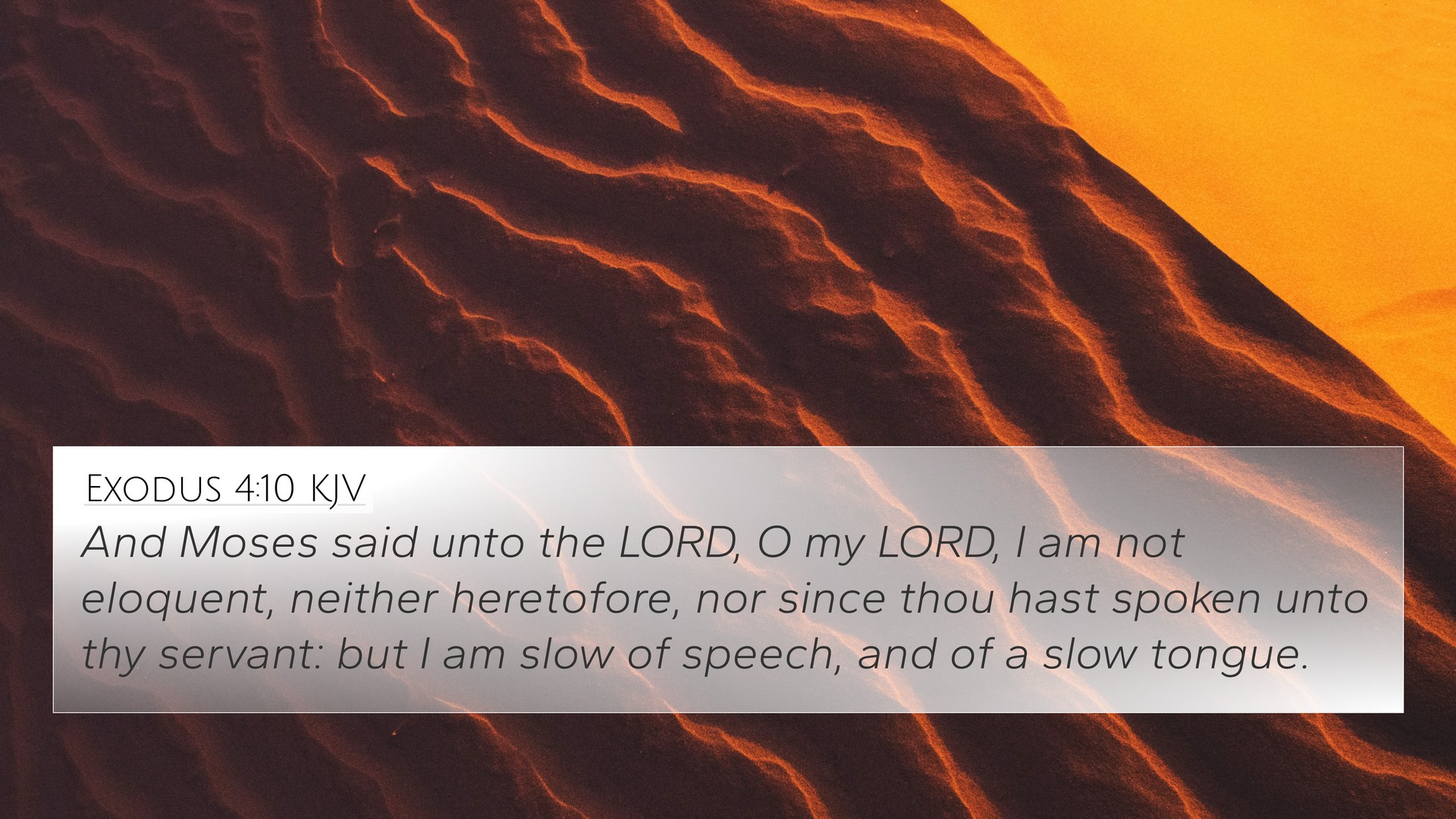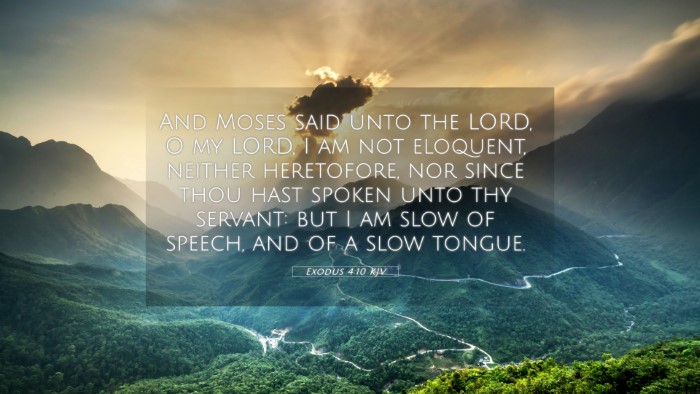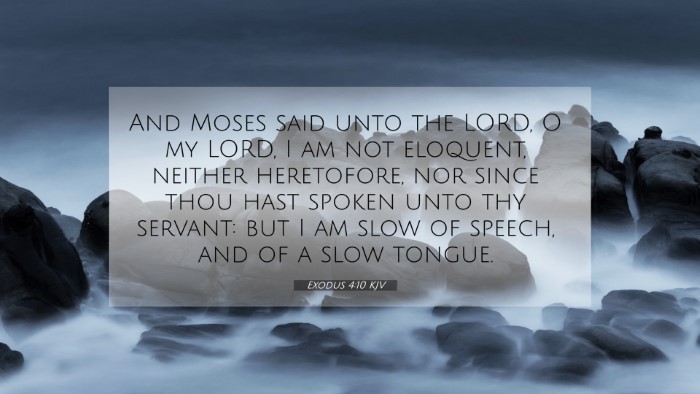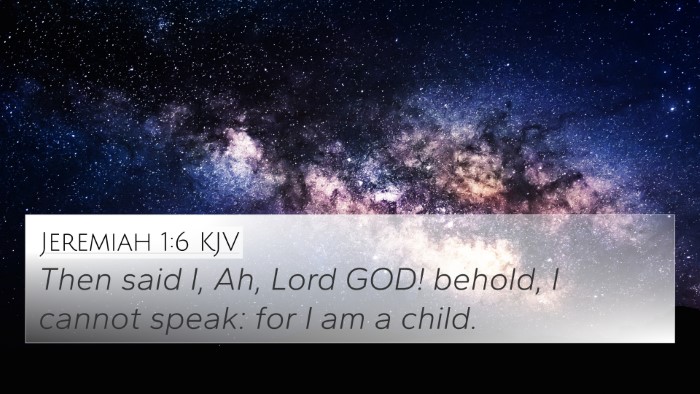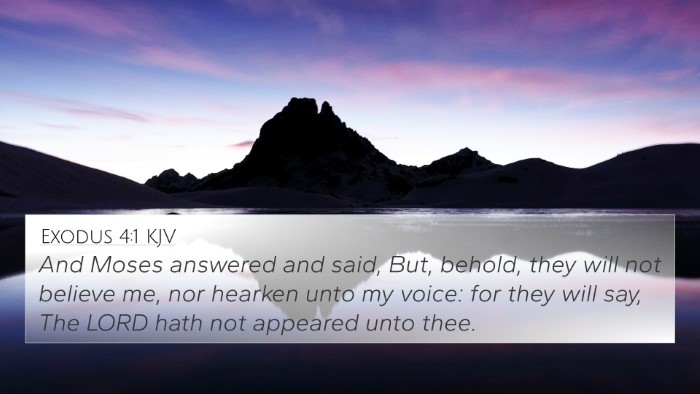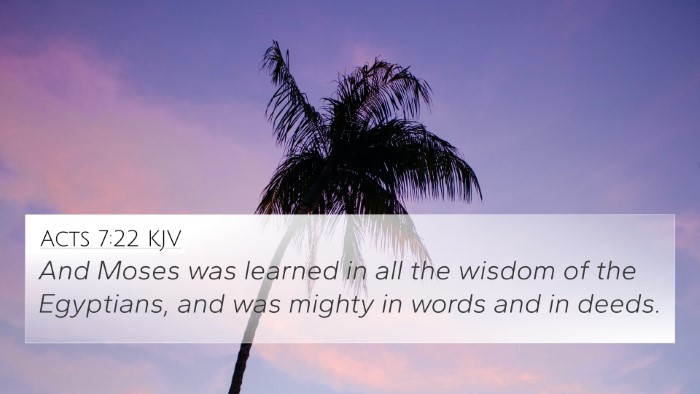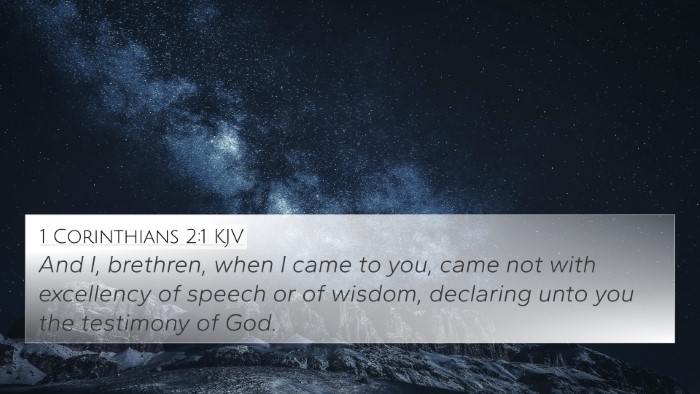Meaning and Interpretation of Exodus 4:10
Exodus 4:10 states:
"And Moses said unto the LORD, O my Lord, I am not eloquent, neither heretofore, nor since thou hast spoken unto thy servant: but I am slow of speech, and of a slow tongue."
This verse highlights Moses' feelings of inadequacy and lack of confidence regarding his speaking abilities as he faces the daunting task of leading the Israelites out of Egypt.
Summary of Insights from Public Domain Commentaries
Matthew Henry's Commentary
Henry emphasizes Moses' humility and self-doubt as significant aspects of his character. His acknowledgment of being "not eloquent" serves as an honest expression of his limitations. It reflects a common theme in the Bible where God chooses unlikely leaders to fulfill His will, showcasing His power through human weakness.
Albert Barnes' Notes
Barnes expands on the idea that Moses’ hesitance stems from past experiences. He points out that Moses might have felt the weight of his previous failures in his attempt to lead his people. His concern about eloquence may reveal deeper fears of rejection and a lack of faith in God’s empowerment. Barnes underscores God’s reassurance in response to Moses’ insecurities, affirming that divine selection guarantees divine assistance.
Adam Clarke's Commentary
Clarke elaborates on the term "slow of speech" as potentially indicating a speech impediment or philosophical hesitance. He links Moses’ experience to a broader theological discussion about communication and God’s will, suggesting that God equips those He calls, even when they feel unprepared. Clarke also asserts that this encounter sets the stage for the miraculous signs and wonders that would accompany Moses' prophetic ministry.
Thematic Connections and Cross-References
Exodus 4:10 can be deeply explored through various related scripture passages that enhance understanding of its themes:
- Isaiah 6:5 - Isaiah’s recognition of his unworthiness echoes Moses’ feelings of inadequacy, highlighting God's grace in calling imperfect figures.
- 1 Corinthians 1:27-29 - Paul’s declaration that God chooses the foolish and weak to shame the wise and strong reinforces the message that human deficiencies do not obstruct divine plans.
- Jeremiah 1:6-8 - Jeremiah’s reluctance to speak due to his youth parallels Moses' hesitations, showing a recurring motif of self-doubt in prophetic callings.
- Acts 7:22 - Stephen’s recounting of Moses’ backstory emphasizes his education and status, contrasting with his reluctance and God’s choosing him for leadership.
- Romans 8:28 - The assurance that God works all things for good ties into the reassurance God extends to Moses that his perceived weaknesses can be vessels for divine purpose.
- Luke 12:11-12 - Jesus’ assurance to His followers that the Holy Spirit will speak through them underscores the idea that God empowers those He calls.
- Philippians 4:13 - Paul’s assertion that he can do all things through Christ who strengthens him is a reminder that God equips those He calls, echoing Moses’ situation.
- 2 Timothy 1:7 - The emphasis on not being given a spirit of timidity reinforces God's desire for His messengers to be bold despite their fears.
- Hebrews 11:23-29 - The reference to Moses' faith in action demonstrates that he eventually overcame his fears and became a key figure in Israel's deliverance.
- 1 Peter 5:5 - The call for humility among believers reminds us that God's power is made perfect in weakness, a concept that resonates through Moses' reluctance in Exodus.
Conclusion
The verse Exodus 4:10 serves as a profound meditation on the reluctance that often accompanies God’s calling. It reassures readers that feelings of inadequacy can coexist with divine purpose. Everyone is invited to explore and study the connections between this verse and others to gain a deeper understanding of God’s way of empowering His chosen, countering the human tendency to focus on limitations.
Tools for Bible Cross-Referencing
For deeper study, utilizing tools for Bible cross-referencing can significantly enhance one's understanding:
- Bible concordance - A robust tool for locating specific themes or words.
- Bible cross-reference guide - A resource for connecting verses across scripture.
- Coding a Bible reference system - Developing systematic methods for studying scripture relationships.
- Bible chain references - Following thematic connections through a series of related verses.
- Cross-reference Bible study methods - Approaches to studying scripture that emphasize interconnectedness.
Understanding the connections between Bible verses allows one to engage in a rich dialogue with scripture, paving the way for insightful interpretations and applications in daily life.
